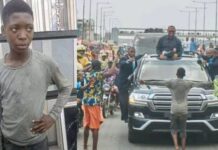The Boko Haram insurgents captured Gwoza, one of the largest towns in Borno State, in August 2014.
Gwoza, about 135km to Maiduguri, is surrounded by mountains and it is adjacent to the country’s border with the Republic of Cameroon.
After the attack, the insurgents instantaneously proclaimed Gwoza as their caliphate and held it until March 27, 2015 when Nigerian troops routed them and liberated the town.
 Gwoza was recaptured by the troops less than 24 hours before the 2015 presidential and National Assembly elections but the insurgents only retreated after committing a lot of atrocities in the town.
Gwoza was recaptured by the troops less than 24 hours before the 2015 presidential and National Assembly elections but the insurgents only retreated after committing a lot of atrocities in the town.
The insurgents virtually left the town in ruins, as they razed several houses, including the Emir’s palace, schools, shopping complexes, banks and markets as well banks and filling stations.
Although the Boko Haram insurgents have been forced to flee the town, their imprints — Arabic inscriptions – are on various signposts, houses, banks and filling stations within the neighbourhood.
Nowadays, life is gradually returning to normalcy in Gwoza, as a number of residents, who hitherto fled the town, have returned to their homes.
It was reliably gathered that the troops engaged in an eight-hour battle with the terrorists before they could liberate the town, an indication that the soldiers met some stiff resistance.
The Defence Headquarters, which coordinates the military operations against the terrorists in the North-East, recently took some journalists on tour of the area to see things for themselves.
The Internally Displaced Persons (IDPs), including men, women and children, who returned to the town after its recapture by the troops, appeared quite were excited when they sighted the journalists who were on a guided tour of the town.
Some of the returnees prayed never to experience their town’s occupation by assailants again.
With grief, they narrated stories of how their husbands were killed, how their wives and children raped or conscripted into the fighting force of the insurgents.
They, nonetheless, commended the Federal Government and military for the recapture of the town.
Narrating her ordeal, Hajia Fatima Gwonbo, a resident of Gwoza, said that she fled the town after the Boko Haram insurgents killed her child, stole her money and goats.
Gwonbo said that she later returned to Gwoza when soldiers took control of the town, adding that she now felt safe and happy.
Her words: “We are happy that soldiers have come; we returned immediately when we heard that they have taken over the place. Since the soldiers came here, there has not been any problem and we are moving about peacefully.”
Another resident, Mr Adamu Alisika, said that when Boko Haram took over the community, he and his family fled to a cave in the nearby forest for refuge.
“But we came back since March 20 and till date; there has not been any problem. We are grateful to the military, may God help them to fight the Boko Haram,’’ he said.
Similarly, Alhaji Bello Musa, another resident, expressed happiness that the troops had recaptured the town, recalling that he also hid in the bush during the period when the insurgents occupied town.
He said that the residents were now confident that the terrorists would not return to Gwoza because of the presence of soldiers, urging the government to deploy more soldiers to secure the entire area.
Maj.-Gen. Chris Olukolade, the Director of Defence Information, who led journalists on the tour, assured the people that the Federal Government would do everything possible to make them comfortable.
The general also conveyed the determination of the Nigerian military to ensure that “terrorists will never again take over any community in the country’’.
He emphasised that the military was in the final phase of wiping out terrorists from the entire North-East geopolitical zone.
“So, you see that the military advance is still continuing and the tempo of the mission is high, we have entered the final phase of the mission,’’ he said.
Olukolade said that the tour of the neighbourhood was undertaken to expose to journalists the level of atrocities committed by the terrorists before they vacated the area.
He said that the tour was also to confirm that life in the area was returning to normalcy after the entry of troops, adding that the journalists’ media interaction with members of the community was indicative that they were confident of their security.
“The areas left to be captured are very minimal; what is important now is the stabilisation of the territories taken back and the mopping up operations as well as the cordon-and-search operations that are ongoing,’’ he said.
Olukolade said that the Multi-National Joint Task Force (MNTJTF) was constituted to guarantee the success of the mission.
He said that the task force would guard against the repeat of a previous situation where troops had swept the terrorist off, only for them to regroup in other places.
He, however, said that it would now be extremely difficult for the terrorists to regroup, considering the involvement of the MNJTF that was specifically mandated to operate along the border areas.
“And they are there to ensure that there is no new breeding ground and escape route for the terrorists,’’ he added.
At Gwoza, there was a heavy presence of troops and military equipment such as Armoured Personnel Carriers (APCs), main battle tanks and artillery pieces, as soldiers continue with the cordon-and-search operations in the area.
Col. Oduware Irabor, the Commander of 26 Task Force of the Nigerian Army in Gwoza, told newsmen that the town was liberated from the clutches of the terrorists after heavy fighting and bombardment by troops of the Nigerian Army and Air force.
He said that since the troops took over the area, peace had been restored and people were now moving around, carrying on with their various businesses.
Irabor said that the military was carrying out constant patrols of the area, so as to ensure the sustenance of the people’s peace and safety.
“We have not rested on our oars, as we have been training and retraining our soldiers, while assisting the IDPs with our limited facilities,’’ he said.
It would be recalled that military asked for a six-week extension of its campaign in order to launch a renewed offensive against the Boko Haram insurgents, while liberating the towns and communities they hitherto occupied.
The troops have secured a string of victories since the launch of the renewed offensive on the terrorist group, as most communities, previously occupied by terrorists, have been liberated.
The military, through air and land strikes in the past few weeks, had been able to liberate several communities from the terrorists.
Since its commencement of the extensive six-week anti-Boko Haram operation on February 14, the soldiers have succeeded in dislodging terrorists from several communities in Adamawa, Yobe and Borno states.
The liberated communities include Gwoza, Mubi, Bara, the headquarters of Gulani Local Government Area of Yobe State, and Gulak, the headquarters of Madagali Local Government Area of Adamawa State.
Other liberated communities, according to the military, include Shikah, Fikayel, Tetebah, Buza, Kamla and Bumsa.
The troops also recovered Monguno, Marte, Gamboru Ngala, Dikwa and Baga, among other communities.
Having successfully liberated most of the towns, the troops’ attention is now focused on consolidating the security of the areas to pave the way for the return of citizens to their normal life.
In the campaign, Nigerian troops also had some level of support from neighbouring countries like Chad and Niger that are involved in the Multi-National Task Force.
Observers, however, are of the opinion that as the military continues to record successes in is campaign against the Boko Haram insurgents, the menace of terrorism in the country will soon be brought to an end. (NANFeatures)














